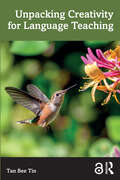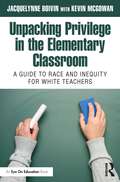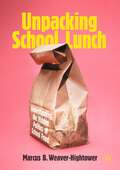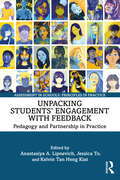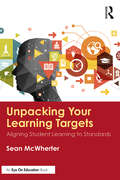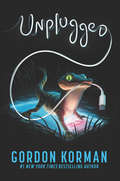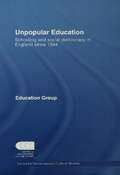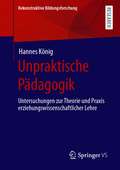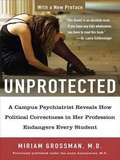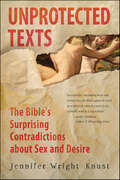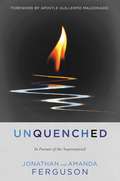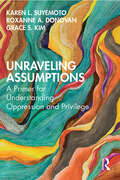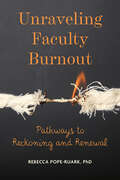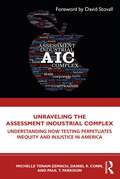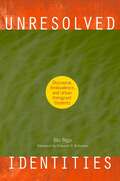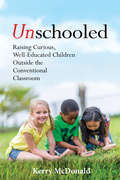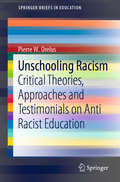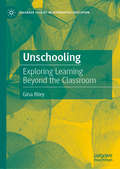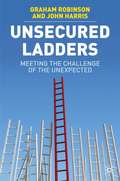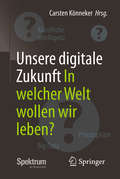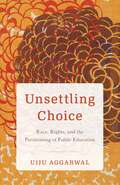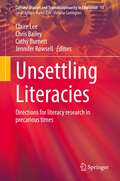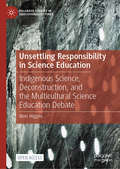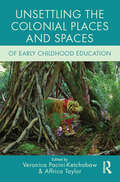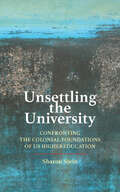- Table View
- List View
Unpacking Creativity for Language Teaching
by Tan Bee TinBefore unlocking creativity, we must first unpack what it means. In this book, creativity is unravelled from various perspectives and the relevance for language teaching and learning is explored. Tin offers a coherent discussion of creativity, adopting an inclusive and integrated but, at the same time, focused approach to creativity. Divided into 12 chapters, the book covers: A critical review of the way the term ‘creativity’ is used, defined and written about in various disciplines Various models and theories of creativity, the product- and process-oriented views of creativity and their relevance for language teaching Three pillars on which creative language pedagogy should be based Over 60 practical tasks, applying theoretical arguments and principles of creativity to language teaching and learning Based on the author’s own practice and research on creativity over the last two decades, the book provides exciting new ideas for scholars and practitioners interested in creativity and creative language pedagogy. The book serves as an important contribution for students, teachers and scholars in the field of applied linguistics, language teaching and education.
Unpacking Privilege in the Elementary Classroom: A Guide to Race and Inequity for White Teachers
by Jacquelynne Boivin Kevin McGowanBrimming with reflection and resources, this book is ideal for white elementary teachers who wish to host conversations about race with their predominantly white classes.This book is a clear-cut guide for integrating antiracism into teaching and education, along with policy reform needed for systemic change. Providing hands-on experience and practical insights from literature, it breaks down subject-specific strategies to approach racial conversations. The book acknowledges the variety of challenges that teachers face and encourages them to continue self-work as a step towards supporting students.While specifically targeting all-white and predominantly white classrooms, this resource is suitable for additional professional development and educator preparation programs when considering a variety of racial dynamics.
Unpacking School Lunch: Understanding the Hidden Politics of School Food
by Marcus B. Weaver-HightowerThis book delves into the heated political battles over what kids eat at school, shedding light onto how policymakers craft food policy for schools. The book takes readers inside schools, through the history of school food programs in the United States and England, and into the policy terrain that makes school lunch difficult to change. Through diverse case studies—hungry linebackers, pink slime, English reality television and policy making, pizza as a vegetable, lunch shaming, and more—chapters provide detailed analysis of rhetorical tactics, arguments over, and policy for school feeding. The book concludes with a progressive vision of school food that is healthy, pleasurable, educative, shame-free, and, most importantly, free for all students, just like the rest of school.
Unpacking Students’ Engagement with Feedback: Pedagogy and Partnership in Practice (Assessment in Schools: Principles in Practice)
by Anastasiya A. Lipnevich Jessica To Kiat, Kelvin Tan HengLearners of all levels receive a plethora of feedback messages on a daily – or even hourly – basis. Teachers, coaches, parents, peers – all have suggestions and advice on how to improve or sustain a certain level of performance. This volume offers insights into the complexity of students’ engagement with feedback, the diversity of teachers’ feedback practices, and the influence of personal assessment beliefs in tension with prevailing contexts. It focuses on two main sections: what is students’ engagement with feedback? And what is the variety of teachers’ feedback practices? Under these themes, the content covers a broad range of key topics pertaining to instructional feedback, how it operates in a classroom and how students engage with feedback. Unarguably, feedback is a key element of successful instructional practices – however we also know that (a) learners often dread it and dismiss it and (b) the effectiveness of feedback varies depending on teacher’s and student’s characteristics, specific characteristic of feedback messages that learners receive, as well as a number of contextual variables. What this volume articulates are new ways for learners to engage with feedback beyond recipience and uptake. With nuanced insights for research and practice, this book will be most useful to teachers, university teacher educators, and researchers working to design and enact new ways of engaging with feedback in schools and beyond.
Unpacking your Learning Targets: Aligning Student Learning to Standards
by Sean McWherterThis accessible resource assists teachers, instructional coaches, principals, and curricular leaders to adopt a simple, straightforward framework that allows educators to seamlessly align high quality learning targets with specific standards. Full of examples across grade levels and subjects, this useful book helps educators deepen their understanding of content and design more efficient lessons that will aid student learning and readiness. Unpacking Your Learning Targets is a guide into a deeper understanding of creating and designing learning targets that foster student learning and success for all.
Unplugged
by Gordon KormanFrom New York Times bestselling author Gordon Korman comes a hilarious middle grade novel about a group of kids forced to “unplug” at a wellness camp—where they instead find intrigue, adventure, and a whole lot of chaos. Perfect for fans of Korman’s The Unteachables and Masterminds series, as well as Carl Hiaasen’s eco mysteries. As the son of the world’s most famous tech billionaire, spoiled Jett Baranov has always gotten what he wanted. So when his father’s private jet drops him in the middle of a place called the Oasis, Jett can’t believe it. He’s forced to hand over his cell phone, eat grainy veggie patties, and participate in wholesome activities with the other kids whom he has absolutely no interest in hanging out with. As the weeks go on, Jett starts to get used to the unplugged life and even bonds with the other kids over their discovery of a baby-lizard-turned-pet, Needles. But he can’t help noticing that the adults at the Oasis are acting really strange. Could it be all those suspicious “meditation” sessions? Jett is determined to get to the bottom of things, but can he convince the other kids that he is no longer just a spoiled brat making trouble?
Unpopular Education: Schooling and Social Democracy in England since 1944
by CccsPublished in the year 2006, Unpopular Education is a valuable contribution to the field of Media and Cultural Studies.
Unpraktische Pädagogik: Untersuchungen zur Theorie und Praxis erziehungswissenschaftlicher Lehre (Rekonstruktive Bildungsforschung #34)
by Hannes KönigDiese Arbeit widmet sich einer fallrekonstruktiven Untersuchung der Lehrpraxis der Erziehungswissenschaft im Lehramtsstudium. Auf der Grundlage empirischer Interaktionsanalysen versucht sie neue Antworten auf alte Fragen zu geben: Was soll und kann ein universitäres erziehungswissenschaftliches (Lehramts-)Studium sein und leisten und was nicht? In diesem Zuge werden zugleich die Kardinalthemen des Selbstbeobachtungsdiskurses der schwierigen Disziplin Erziehungswissenschaft (Disziplinäre Identität, Normativität, Theorie-Praxis-Problem) im Lichte neuer Einsichten in die Wirklichkeit ihrer Lehre diskutiert.
Unprotected
by Miriam GrossmanOur campuses are steeped in political correctness-that's hardly news to anyone. But no one realizes that radical social agendas have also taken over campus health and counseling centers, with dire consequences. Psychiatrist Miriam Grossman knows this better than anyone. She has treated more than 2,000 students at one of America's most prestigious universities, and she's seen how the anything- goes, women-are-just-like-men, "safer-sex" agenda is actually making our sons and daughters sick. Dr. Grossman takes issue with the experts who suggest that students problems can be solved with free condoms and Zoloft. What campus counselors and health providers must do, she argues, is tell uncomfortable, politically incorrect truths, especially to young patients in their most vulnerable and confused moments. Instead of platitudes and misinformation, it's time to offer them real protection.
Unprotected Texts: The Bible's Surprising Contradictions About Sex and Desire
by Jennifer Wright Knust“An explosive, fascinating book that reveals how the Bible cannot be used as a rulebook when it comes to sex. A terrific read by a top scholar.” —Bart Ehrman, author of Misquoting Jesus Boston University’s cutting-edge religion scholar Jennifer Wright Knust reveals the Bible’s contradictory messages about sex in this thoughtful, riveting, and timely reexploration of the letter of the gospels. In the tradition of Bart Erhman’s Jesus Interrupted and John Shelby Spong’s Sins of Scripture, Knust’s Unprotected Texts liberates us from the pervasive moralizing—the fickle dos and don’ts—so often dictated by religious demagogues. Knust’s powerful reading offers a return to the scripture, away from the mere slogans to which it is so often reduced.
Unquenched: In Pursuit of the Supernatural
by Amanda Ferguson Jonathan Fergusonp.p1 {margin: 0.0px 0.0px 0.0px 0.0px; font: 12.0px 'Helvetica Neue'; color: #454545} God is able to do immeasurably more that what we often embrace. And Jonathan and Amanda Ferguson show us that we need to ask for more, expect more, and by His Spirit believe and actually apprehend the more of God.It's time to experience all you can experience in God, be all He has called you to be, and show the world His supernatural power. The Ferguson's boldly share how to renew our minds and bring revival to our hearts.God's original intent with man was for our spirits to know and commune with Him, like Adam and Eve in the Garden of Eden before the deception of the serpent led them to their fall. Without walking in Eden, how can we come to know a God we have not seen? Jonathan and Amanda Ferguson say that knowing who God is has everything to do with learning:His waysHis heartHis characterHis written wordHis mindHis passionObtaining supernatural experiences with Him.God's ability to reveal Himself is the avenue through which we come to know Him; the realization of that truth is evident when each person experiences God for himself. Supernatural experience may mean hearing His voice, seeing angels, or having heavenly visitations, outer body experiences, seeing visions, or even being granted insight into what God has planned for future events.The other side of knowing God is to know what God can actively, physically do. This side of the supernatural includes the performance of signs, wonders, and miracles. Combining both aspects of knowing God is what the Fergusons refer to as embracing the full spectrum of the supernatural. All of these components must work hand in hand. In UNQUENCHED, the Fergusons share from their own powerful experiences in order to help readers understand the explosive power of the supernatural in your everyday life.UNQUENCHED shows you how to go after God for a full life! p.p1 {margin: 0.0px 0.0px 0.0px 0.0px; font: 12.0px 'Helvetica Neue'; color: #454545}
Unraveling Assumptions: A Primer for Understanding Oppression and Privilege
by Karen L. Suyemoto Roxanne A. Donovan Grace S. KimUnraveling Assumptions: A Primer for Understanding Oppression and Privilege offers fundamental understandings of concepts and frameworks related to diversity and social justice. Aimed at university and community audiences, it offers an introductory exploration of power, privilege, and oppression as foundations of systems of inequality and examines complexities within meanings and lived experiences of race, ethnicity, gender, sexuality, disability, and social class. After considering why it is so difficult to engage these issues, the authors explore meanings and impacts of power, privilege, and oppression as a primary lens of analysis. Subsequent chapters offer definitions of race, ethnicity, gender, sexuality, disability and social class, identifying erroneous assumptions and challenging the tendency to oversimplify and decontextualize. Meanings, identities, and effects of oppression and privilege are central foci within each chapter. The book ends with a chapter examining ways that individuals may take action as allies and advocates to resist oppression. Throughout the book, Unraveling Assumptions makes connections among individual, interpersonal, and systemic levels of inequality, while focusing on relational and psychological implications for lived experience—including the reader’s lived experience. By integrating social science research with concrete examples and personal reflection, this concise, introductory level text invites the reader to consider the costs of systemic hierarchies for all people and envision possible alternatives to participating in oppressive hierarchy. Unraveling Assumptions is a book for students and community to learn about privilege and oppression. The authors' companion book Teaching Diversity Relationally offers process-oriented guidance for educators teaching this material to successfully negotiate the inherent psychological and relational challenges.
Unraveling Faculty Burnout: Pathways to Reckoning and Renewal
by Rebecca Pope-RuarkA timely book about assessing, coping with, and mitigating burnout in higher education.Faculty often talk about how busy, overwhelmed, and stressed they are. These qualities are seen as badges of honor in a capitalist culture that values productivity above all else. But for many women in higher education, exhaustion and stress go far deeper than end-of-the-semester malaise. Burnout, a mental health syndrome caused by chronic workplace stress, is endemic to higher education in a patriarchal, productivity-obsessed culture. In this unique book for women in higher education, Rebecca Pope-Ruark, PhD, draws from her own burnout experience, as well as collected stories of faculty in various roles and career stages, interviews with coaches and educational developers, and extensive secondary research to address and mitigate burnout. Pope-Ruark lays out four pillars of burnout resilience for faculty members: purpose, compassion, connection, and balance. Each chapter contains relatable stories, reflective opportunities and exercises, and advice from women in higher education.Blending memoir, key research, and reflection opportunities, Pope-Ruark helps faculty not only address burnout personally but also use the tools in this book to eradicate the systemic conditions that cause it in the first place. As burnout becomes more visible, we can destigmatize it by acknowledging that women are not unraveling; instead, women in higher education are reckoning with the productivity cult embedded in our institutions, recognizing how it shapes their understanding and approach to faculty work, and learning how they can remedy it for themselves, their peers, and women faculty in the future.Contributors: Lee Skallerup Bessette, Cynthia Ganote, Emily O. Gravett, Hillary Hutchinson, Tiffany D. Johnson, Bridget Lepore, Jennifer Marlow, Sharon Michler, Marie Moeller, Valerie Murrenus Pilmaier, Catherine Ross, Kristi Rudenga, Katherine Segal, Kryss Shane, Jennifer Snodgrass, Lindsay Steiner, Kristi Verbeke
Unraveling the Assessment Industrial Complex: Understanding How Testing Perpetuates Inequity and Injustice in America
by Michelle Tenam-Zemach Daniel R. Conn Paul T. ParkisonThis book offers a comprehensive critique of how the assessment industry and standardized testing adversely impact students, teachers, and society. The authors present the case that the interconnected developments of the testing industry and the Assessment Industrial Complex (AIC) have effectively anchored American schooling to testing. Using an antiracist lens, the authors deconstruct the AIC, exposing the neoliberal agenda of education reformers and how proponents utilize the rhetoric of testing, and the data extracted from them, to normalize the reliance on AIC systems. This critique further exposes education reformers’ ideological agenda, their hypocrisy, and how they grossly profit from the AIC at the expense of society’s marginalized and most vulnerable students. The CoVid-19 pandemic, society’s racial unrest, and anti-testing movements have aligned to underscore the need to examine systemic oppression and the impact it has on society through our education system. This text exposes how standardized testing perpetuates these injustices and provides the opportunity to disrupt the systems they rely upon and bolster the societal resistance that is needed.
Unresolved Identities: Discourse, Ambivalence, and Urban Immigrant Students (SUNY series, Second Thoughts: New Theoretical Formations)
by Bic NgoIn her ethnographic study of Lao American students at an urban, public high school, Bic Ngo shows how simplistic accounts of these students smooth over unfinished, precarious identities and contested social relations. Exploring the ways that immigrant youth identities are shaped by dominant discourses that simplify and confine their experiences within binary categories of good/bad, traditional/modern and success/failure, she unmasks and examines the stories we tell about them, and unsettles the hegemony of discourses that frame identities within discrete dualisms. Rather than cohesive, the identity negotiations of Lao American students are responses that modify, resist, or echo these discourses. Ngo argues that while Lao American students are changing what it means to be "urban" and "immigrant" youth, most people are unable to read them as doing so, and instead see the youth as confused, backward, and problematic. By illuminating the discursive practices of identity, this study underscores the need to conceptualize urban, immigrant identities as contradictory, fractured and unresolved.
Unschooled: Raising Curious, Well-Educated Children Outside the Conventional Classroom
by Peter Gray Kerry McDonaldEducation has become synonymous with schooling, but it doesn't have to be. As schooling becomes increasingly standardized and test driven, occupying more of childhood than ever before, parents and educators are questioning the role of schooling in society. Many are now exploring and creating alternatives. In a compelling narrative that introduces historical and contemporary research on self-directed education, Unschooled also spotlights how a diverse group of individuals and organizations are evolving an old schooling model of education. These innovators challenge the myth that children need to be taught in order to learn. They are parents who saw firsthand how schooling can dull children's natural curiosity and exuberance and others who decided early on to enable their children to learn without school. Educators who left public school classrooms discuss launching self-directed learning centers to allow young people's innate learning instincts to flourish, and entrepreneurs explore their disillusionment with the teach-and-test approach of traditional schooling.
Unschooling Racism: Critical Theories, Approaches and Testimonials on Anti Racist Education (SpringerBriefs in Education)
by Pierre W. OrelusThis book draws on critical race theories and teachers’ testimonials grounded in 20 years of teaching experiences to reveal the ways in which racial and cultural biases are embedded in school curricula, and both their intended and unintended consequences on the learning and well being of students of color. More specifically, this book examines how these biases have played a significant role in the mis-education, misrepresentation, and marginalization of African American, Native American, Latino and Asian students. But the analysis doesn’t stop there. The author goes beyond the school walls to underscore how systemic racism, paired with colonialism, has impacted the lives of racially marginalized groups in both the United States and developing countries. This book uncovers these injustices and proposes alternative ways in which racism can be unschooled.
Unschooling: Exploring Learning Beyond the Classroom (Palgrave Studies in Alternative Education)
by Gina RileyThis book explores the history of the unschooling movement and the forces shaping the trajectory of the movement in current times. As an increasing number of families choose to unschool, it becomes important to further study this philosophical and educational movement. It is also essential to ascribe theory to the movement, to gain greater understanding of its workings as well as to increase the legitimacy of unschooling itself. In this book, Riley provides a useful overview of the unschooling movement, grounding her study in the choices and challenges facing families as they consider different paths towards educating their children outside of traditional school systems.
Unsecured Ladders
by Graham RobinsonThe book addresses the vital issue of how business leaders can prepare themselves to deal with the impact of unexpected events. It raises key questions for leaders to address if they are to avoid being distracted by crisis and remain in touch with a wider context that is subject to constant uncertainty and change.
Unsere digitale Zukunft
by Carsten KönnekerDroht die ferngesteuerte Gesellschaft?Dieses Buch greift das weithin diskutierte, zum Jahreswechsel 2015/16 veröffentlichte „Digital-Manifest“ auf und führt die Debatte entlang vielfältiger Themenlinien weiter. Es geht hierbei um nicht weniger als unsere – digitale – Zukunft: Welche Chancen eröffnen künstliche Intelligenz und digitale Technologien, welche Risiken und ethische Herausforderungen bergen sie? Wie schützen wir unsere Daten und die Privatsphäre? Wie sichern wir individuelle Freiheit und Demokratie vor Gefahren der digitalen Verhaltenssteuerung? Wie sollen selbstfahrende Autos, Roboter und autonome Agenten unser Leben prägen? Als Gesellschaft und als Individuen müssen wir uns mit verschiedenen Projektionen in die Zukunft auseinandersetzen. Dabei sollten wir die Einschätzungen führender Experten in der Zusammenschau vernehmen und diskutieren. Den kritischen Dialog zu beflügeln, ist das Ziel dieses Sammelbands mit den wichtigsten Beiträgen namhafter Wissenschaftler aus Spektrum der Wissenschaft, Spektrum – Die Woche und Spektrum.de.
Unsettling Choice: Race, Rights, and the Partitioning of Public Education
by Ujju AggarwalHow the Great Recession revealed a system of school choice built on crisis, precarity, and exclusion What do universal rights to public goods like education mean when codified as individual, private choices? Is the &“problem&” of school choice actually not about better choices for all but, rather, about the competition and exclusion that choice engenders—guaranteeing a system of winners and losers? Unsettling Choice addresses such questions through a compelling ethnography that illuminates how one path of neoliberal restructuring in the United States emerged in tandem with, and in response to, the Civil Rights movement. Drawing on ethnographic research in one New York City school district, Unsettling Choice traces the contestations that surfaced when, in the wake of the 2007–2009 Great Recession, public schools navigated austerity by expanding choice-based programs. Ujju Aggarwal argues that this strategy, positioned as &“saving public schools,&” mobilized mechanisms rooted in market logics to recruit families with economic capital on their side, thereby solidifying a public sphere that increasingly resembled the private—where contingency was anticipated and rights for some were marked by intensified precarity for poor and working-class Black and Latinx families. As Unsettling Choice shows, these struggles over public schools—one of the last remaining universal public goods in the United States—were entrapped within neoliberal regimes that exceeded privatization and ensured exclusion even as they were couched in language of equity, diversity, care, and rights. And yet this richly detailed and engaging book also tracks an architecture of expansive rights, care, and belonging built among poor and working-class parents at a Head Start center, whose critique of choice helps us understand how we might struggle for—and reimagine—justice, and a public that remains to be won. Retail e-book files for this title are screen-reader friendly with images accompanied by short alt text and/or extended descriptions.
Unsettling Literacies: Directions for literacy research in precarious times (Cultural Studies and Transdisciplinarity in Education #15)
by Jennifer Rowsell Chris Bailey Cathy Burnett Claire LeeThis book asks researchers what uncertainty means for literacy research, and for how literacy plays through uncertain lives. While the book is not focused only on COVID-19, it is significant that it was written in 2020-2021, when our authors’ and readers’ working and personal lives were thrown into disarray by stay-at-home orders. The book opens up new spaces for examining ways that literacy has come to matter in the world.Drawing on the reflections of international literacy researchers and important new voices, this book presents re-imagined methods and theoretical imperatives. These difficult times have surfaced new communicative practices and opened out spaces for exploration and activism, prompting re-examination of relationships between research, literacy and social justice. The book considers varied and consequential events to explore new ways to think and research literacy and to unsettle what we know and accept as fundamental to literacy research, opening ourselves up for change. It provides direction to the field of literacy studies as pressing global concerns are prompting literacy researchers to re-examine what and how they research in times of precarity.
Unsettling Responsibility in Science Education: Indigenous Science, Deconstruction, and the Multicultural Science Education Debate (Palgrave Studies in Educational Futures)
by Marc HigginsThis open access book engages with the response-ability of science education to Indigenous ways-of-living-with-Nature. Higgins deconstructs the ways in which the structures of science education—its concepts, categories, policies, and practices—contribute to the exclusion (or problematic inclusion) of Indigenous science while also shaping its ability respond. Herein, he undertakes an unsettling homework to address the ways in which settler colonial logics linger and lurk within sedimented and stratified knowledge-practices, turning the gaze back onto science education. This homework critically inhabits culture, theory, ontology, and history as they relate to the multicultural science education debate, a central curricular location that acts as both a potential entry point and problematic gatekeeping device, in order to (re)open the space of responsiveness towards Indigenous ways-of-knowing-in-being.
Unsettling the Colonial Places and Spaces of Early Childhood Education (Changing Images of Early Childhood)
by Veronica Pacini-Ketchabaw Affrica TaylorUnsettling the Colonial Places and Spaces of Early Childhood Education uncovers and interrogates some of the inherent colonialist tensions that are rarely acknowledged and often unwittingly rehearsed within contemporary early childhood education. Through building upon the prior postcolonial interventions of prominent early childhood scholars, Unsettling the Colonial Places and Spaces of Early Childhood Education reveals how early childhood education is implicated in the colonialist project of predominantly immigrant (post)colonial settler societies. By politicizing the silences around these specifically settler colonialist tensions, it seeks to further unsettle the innocence presumptions of early childhood education and to offer some decolonizing strategies for early childhood practitioners and scholars. Grounding their inquiries in early childhood education, the authors variously engage with postcolonial theory, place theory, feminist philosophy, the ecological humanities and indigenous onto-epistemologies.
Unsettling the University: Confronting the Colonial Foundations of US Higher Education (Critical University Studies)
by Sharon SteinShifts the narrative around the history of US higher education to examine its colonial past.Over the past several decades, higher education in the United States has been shaped by marketization and privatization. Efforts to critique these developments often rely on a contrast between a bleak present and a romanticized past. In Unsettling the University, Sharon Stein offers a different entry point—one informed by decolonial theories and practices—for addressing these issues.Stein describes the colonial violence underlying three of the most celebrated moments in US higher education history: the founding of the original colonial colleges, the creation of land-grant colleges and universities, and the post–World War II "Golden Age." Reconsidering these historical moments through a decolonial lens, Stein reveals how the central promises of higher education—the promises of continuous progress, a benevolent public good, and social mobility—are fundamentally based on racialized exploitation, expropriation, and ecological destruction.Unsettling the University invites readers to confront universities' historical and ongoing complicity in colonial violence; to reckon with how the past has shaped contemporary challenges at institutions of higher education; and to accept responsibility for redressing harm and repairing relationships in order to reimagine a future for higher education rooted in social and ecological accountability.
